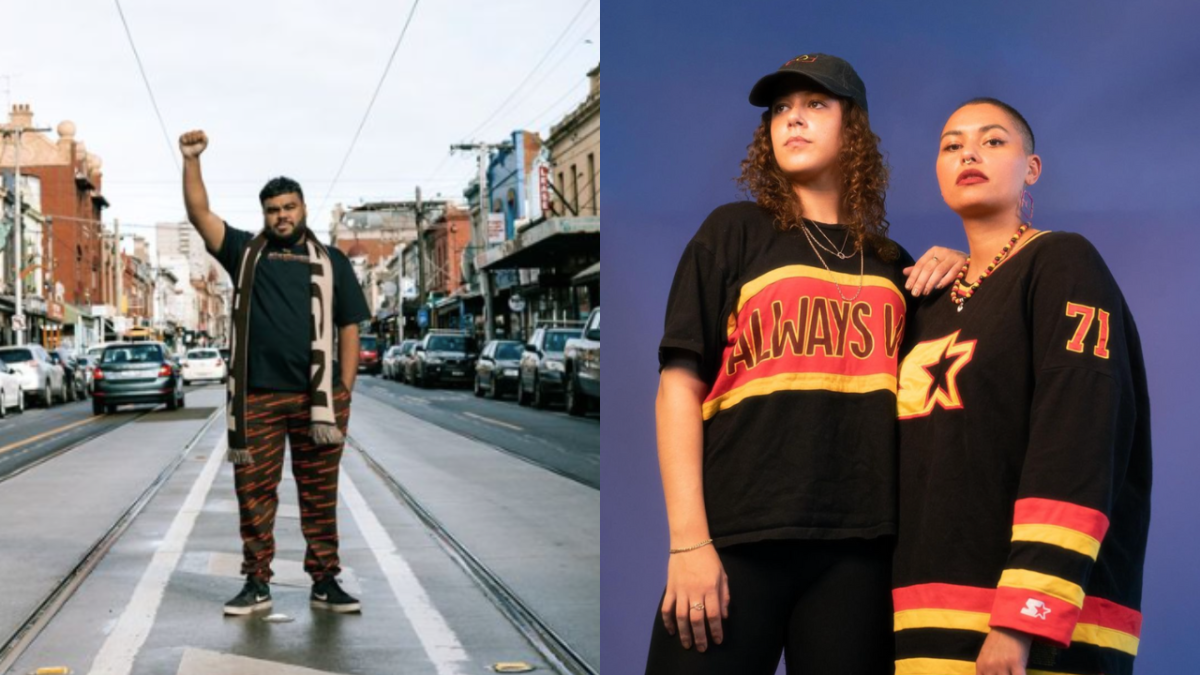
Prime Minister Anthony Albanese announced last week Australians would be given a one-off public holiday to mourn Queen Elizabeth II, but many First Nations people are choosing not to observe.
First Nations-owned fashion label Clothing The Gaps announced on social media last week its website and Melbourne store would remain open on September 22 in protest of the monarchy and out of respect for First Nations people who have died and suffered under the Crown.
“It really felt like the right the do and the respectful thing to do was to stay open out of respect for our ancestors and not acknowledge or participate in the day,” Clothing The Gaps CEO and co-founder and Gunditjmara woman Laura Thompson told PEDESTRIAN.TV.
“The traditional custodians, Aboriginal and Torres Strait Islanders, certainly weren’t mourning the death of the Queen, nor were we celebrating. For us, it was a moment to reflect on the colonisation of this country and the impacts on First Nations people.
Albanese said the holiday would be a “unifying moment” and that traditions were “important”. But Thompson said his words didn’t represent the views of many Australians.
“The Prime Minister’s really off the mark in the way that he’s addressing the Australian public. Aboriginal and Torres Strait Islander people don’t feel included or like our voices are being heard,” she said.
The public holiday and the PM’s message of unity have been criticised widely by First Nations people and advocates who say his assertions on needing to mourn the Queen were insulting.
“Demanding Indigenous people be respectful about the passing of someone who intentionally made our lives worse is outrageous,” Macquarie University Indigenous studies professor Sandy O’Sullivan tweeted as the host of IndigenousX last week.
For those saying we should be magnanimous about the passing of the queen, a reminder that the queen inserted herself into the lives of Indigenous people here multiple times. She wasn’t a bystander to the effects of colonisation and colonialism, she was an architect of it.
— IndigenousX (@IndigenousX) September 8, 2022
Noongar woman and human rights lawyer Roxy Moore pointed out the absence of a national day of mourning for the hundreds of Aboriginal people who have died in police custody.
If we had a public day of mourning for every Aboriginal death in custody there’d be one every single day. That is the legacy of the Queen & her colonies that our people have to live with today, because governments choose to do nothing about it.
— Roxy Moore (@Roxy_Moore_) September 11, 2022
While Greens senator David Shoebridge drew the unfortunate comparison between Albanese declaring a day of mourning for the Queen and his unwillingness to change the date of Australia Day from January 26, which has been known as a day of mourning for First Nations peoples for decades.
First Nations people declared 26 January as a Day of Mourning in 1938. They’re still asking Governments to listen. Surely now it’s time.
— David Shoebridge (@DavidShoebridge) September 11, 2022
Obviously, regardless of their values, many people would happily take an extra day off next week. It’s fair enough to want to get paid not to work. This is why Clothing The Gaps staff will be given the option to substitute the public holiday for another day off.
Thompson said she hoped the move would empower workers to have the same conversation with their managers and encourage employers to offer their staff the same choice.
“Many [First Nations] people are actually negotiating substituting their public holiday so they can continue to work,” Thompson said.
“And employers need to be able to lead with their values and acknowledge that people, for their own values or cultural beliefs, might not want to celebrate or participate in certain days that the government announces as significant on our behalf.”
Some businesses already give staff the option to work through any public holidays and earn a day of time off in lieu. Public servants also have this right. But some workers’ rights advocates say this should applicable in all workplaces because there’s currently no legal framework for workers to negotiate or substitute public holidays.
Many of Australia’s public holidays are Christian holy days so advocates say someone who’s, for example, not Christian should be able to continue to work through Easter or Christmas if they want to and take those days off for their own cultural or religious events that aren’t national public holidays.
Australian Council of Trade Unions Secretary Sally McManus told PEDESTRIAN.TV if workers had more bargaining power under the Fair Work Act they would be able to do this.
“Expanded access to a simple and fair bargaining system will allow working people to make agreements with their employers which make sense to them and acknowledge the way their work as well who they are as people,” McManus said.
“This could include better recognition of important religious holidays and cultural events within a workplace.”
But the government has made no mention of updating the Act anytime soon.
Thompson hopes that Clothing the Gaps’ initiative will circumvent policymaking and spark conversations among non-First Nations businesses this week and in the lead-up to January 26.
“If the government’s not going to come in and make the changes in respect for First Nations people, how can the rest of Australia support First Nations people? One thing they can do is not recognise these public holidays,” she said.
“I think that’s the sort of leadership I’d like to see in this country.”



